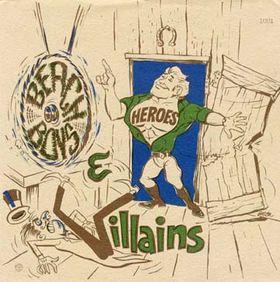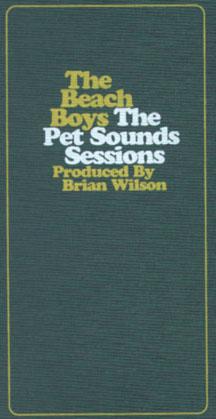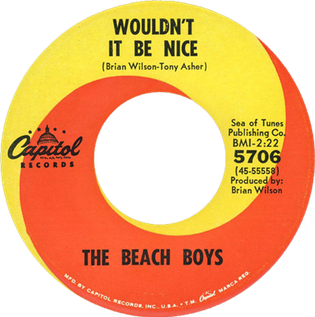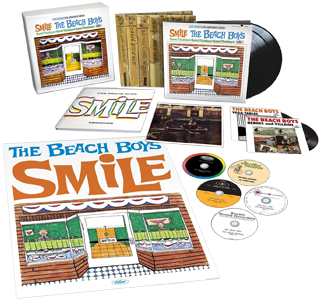
Pet Sounds is the eleventh studio album by the American rock band the Beach Boys, released on May 16, 1966 by Capitol Records. It was initially met with a lukewarm critical and commercial response in the United States, peaking at number 10 on the Billboard Top LPs chart. In the United Kingdom, the album was lauded by critics and reached number 2 on the Record Retailer chart, remaining in the top ten for six months. Promoted there as "the most progressive pop album ever", Pet Sounds was recognized for its ambitious production, sophisticated music, and emotional lyrics. It is now considered to be among the greatest and most influential albums in music history.

Brian Wilson Presents Smile is the fifth studio album by American musician Brian Wilson, released on September 28, 2004 on Nonesuch. It features all-new recordings of music that he had originally created for Smile, an unfinished album by the Beach Boys that he abandoned in 1967. Revisiting Smile was an intense emotional undertaking for Wilson, as he had been deeply traumatized by the circumstances that had originally surrounded the project.

Mastering, a form of audio post production, is the process of preparing and transferring recorded audio from a source containing the final mix to a data storage device, the source from which all copies will be produced. In recent years digital masters have become usual, although analog masters—such as audio tapes—are still being used by the manufacturing industry, particularly by a few engineers who specialize in analog mastering.

Multitrack recording (MTR), also known as multitracking, is a method of sound recording developed in 1955 that allows for the separate recording of multiple sound sources or of sound sources recorded at different times to create a cohesive whole. Multitracking became possible in the mid-1950s when the idea of simultaneously recording different audio channels to separate discrete "tracks" on the same reel-to-reel tape was developed. A "track" was simply a different channel recorded to its own discrete area on the tape whereby their relative sequence of recorded events would be preserved, and playback would be simultaneous or synchronized.

Smiley Smile is the 12th studio album by American rock band the Beach Boys, released on September 18, 1967. Conceived as a simpler and more relaxed version of their unfinished Smile album, Smiley Smile is distinguished for its homespun arrangements, "stoned" aesthetic, and lo-fi production. Critics and fans generally received the album and its lead single, "Heroes and Villains", with confusion and disappointment. The album reached number 9 on UK record charts, but sold poorly in the US, peaking at number 41—the band's lowest chart placement to that point.

"Good Vibrations" is a song by the American rock band the Beach Boys that was composed by Brian Wilson with lyrics by Mike Love. It was released as a single on October 10, 1966 and was an immediate critical and commercial hit, topping record charts in several countries including the United States and the United Kingdom. Characterized by its complex soundscapes, episodic structure and subversions of pop music formula, it was the most expensive single ever recorded. "Good Vibrations" later became widely acclaimed as one of the finest and most important works of the rock era.

"Heroes and Villains" is a song by the American rock band the Beach Boys from their 1967 album Smiley Smile and their unfinished Smile project. Written by Brian Wilson and Van Dyke Parks, Wilson envisioned the song as an Old West-themed musical comedy that would surpass the recording and artistic achievements of "Good Vibrations". The single was Brother Records' first release. While it failed to meet critical and commercial expectations, it was a hit record, peaking at number 12 in the U.S. and number 8 in the UK.
Overdubbing is a technique used in audio recording in which audio tracks that have been pre-recorded are then played back and monitored, while simultaneously recording new, doubled, or augmented tracks onto one or more available tracks of a digital audio workstation (DAW) or tape recorder. The overdub process can be repeated multiple times. This technique is often used with singers, as well as with instruments, or ensembles/orchestras. Overdubbing is typically done for the purpose of adding richness and complexity to the original recording. For example, if there are only one or two artists involved in the recording process, overdubbing can give the effect of sounding like many performers.

The Pet Sounds Sessions is a 4-CD box set by the American rock band the Beach Boys. Released on November 4, 1997, by Capitol Records, it compiles tracks from the group's 11th studio album Pet Sounds (1966) and its 1965–66 recording sessions. The entire album is included in its original mono mix, as well as a specially-created digital stereo mix. The set also contains instrumental tracks, vocals-only tracks, alternate mixes, and edited highlights from the recording sessions for many of the album's songs, along with several tracks not included on the album.

"Wouldn't It Be Nice" is a song by the American rock band the Beach Boys and the opening track from their 1966 album Pet Sounds. Written by Brian Wilson, Tony Asher, and Mike Love, it is distinguished for its sophisticated Wall of Sound-style arrangement and refined vocal performances, and is regarded among the band's finest songs. With its juxtaposition of joyous-sounding music and melancholic lyrics, it is considered a formative work of power pop, and with respect to musical innovation, progressive pop.
"That's Not Me" is a song by the American rock band the Beach Boys from their 1966 album Pet Sounds. Written by Brian Wilson and Tony Asher, it is distinguished for its sophisticated harmonic structure and its sudden shifts in mood and instrumental textures. Owing to its relatively sparse orchestration, it is the track on Pet Sounds that most closely resembles a conventional rock song.

"Here Today" is a song by the American rock band the Beach Boys from their 1966 album Pet Sounds. Written by Brian Wilson and Tony Asher, the lyric warns the listener of inevitable heartbreak before the narrator reveals himself to be the ex-boyfriend of the listener's newfound love. Musically, the song features an uncommon formal structure, the use of electric bass guitar as a lead instrument, and a 20-bar length instrumental break.

"Surf's Up" is a song recorded by the American rock band the Beach Boys that was written by Brian Wilson and Van Dyke Parks. It was originally intended for Smile, an unfinished Beach Boys album that was scrapped in 1967. The song was later completed by Brian and Carl Wilson as the closing track of the band's 1971 album Surf's Up.
"Vegetables" is a song by American rock band the Beach Boys from their 1967 album Smiley Smile and their unfinished Smile project. Written by Brian Wilson and Van Dyke Parks, the song was conceived by Wilson as a tongue-in-cheek promotion of organic food. Another reported inspiration for the song was a humorous comment Wilson heard about the effect of marijuana turning him and his friends into a "vegetative" state.
"Summer Means New Love" is an instrumental composed by the American rock band the Beach Boys from their 1965 album Summer Days . Composed by Brian Wilson, it was later released as the B-side to his first single, "Caroline, No", which subsequently appeared on Pet Sounds (1966).
Mark Linett is an American record producer and audio engineer who is best known for his remixing and remastering of the Beach Boys' catalog. Since 1988, he has been the engineer for Brian Wilson's recordings. He has also worked with Red Hot Chili Peppers, Jane's Addiction, Los Lobos, Rickie Lee Jones and Randy Newman. Linett is based in Glendale, California, where he owns a home studio, Your Place or Mine Recording.

The Smile Sessions is a compilation album and box set recorded by American rock band the Beach Boys, released on October 31, 2011 by Capitol Records. The set is the follow-up to The Pet Sounds Sessions (1997), this time focusing on the abandoned recordings from the band's unfinished 1966–1967 album Smile. It features comprehensive session highlights and outtakes, with the first 19 tracks comprising a hypothetical version of the completed Smile album.

Multitrack recording of sound is the process in which sound and other electro-acoustic signals are captured on a recording medium such as magnetic tape, which is divided into two or more audio tracks that run parallel with each other. Because they are carried on the same medium, the tracks stay in perfect synchronization, while allowing multiple sound sources to be recorded at different times.
"Child Is Father of the Man" is a song by American rock band the Beach Boys that was written by Brian Wilson and Van Dyke Parks. It was originally recorded for the band's never-finished album Smile. In 2004, Wilson rerecorded the song for Brian Wilson Presents Smile. In 2011, the Beach Boys' original recording was released on The Smile Sessions.

Many recordings and performances by the Beach Boys have attained some level of public circulation without being available as a legal release, and several albums by the band or its individual members were fully assembled or near completion before being shelved, rejected, or revised as an entirely new project. Since the early 1980s, numerous rarities compilations and album reissues have been released with studio outtakes included as bonus tracks.













